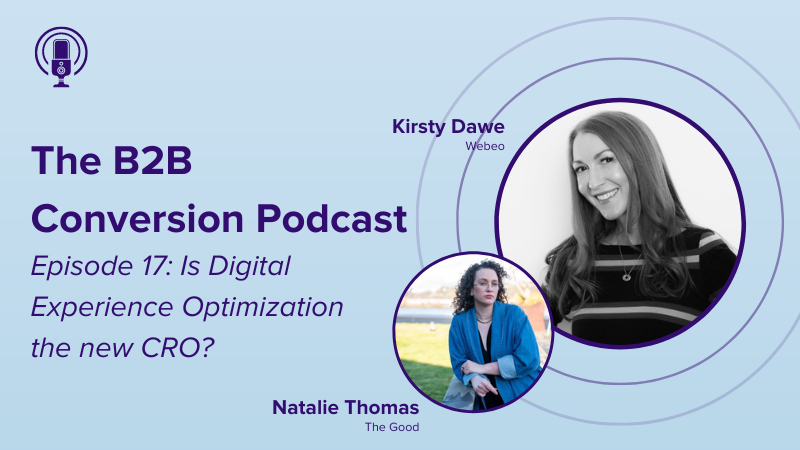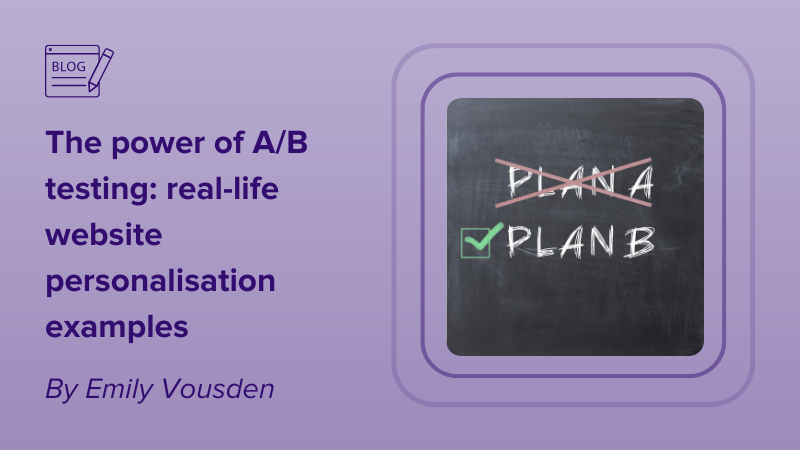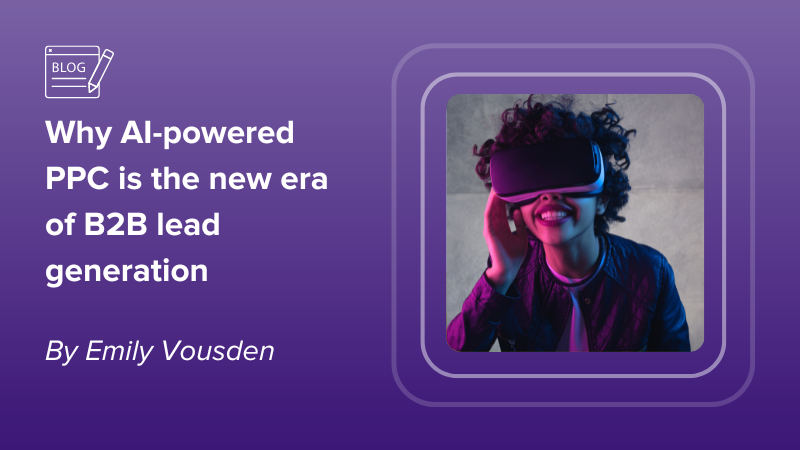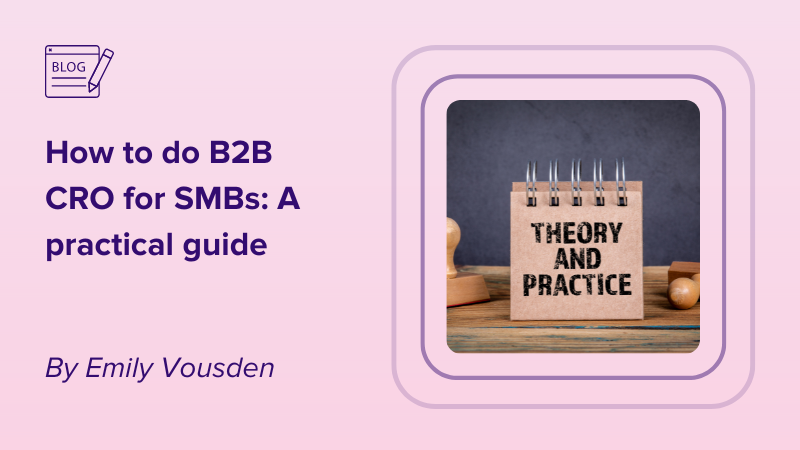According to Email Monday, 55% of top B2B organizations have already implemented marketing automation technology. That means well over half of the most successful business-to-business companies are experiencing the benefits by incorporating this marketing technology. And, there are countless benefits. 91% of marketing automation users say it is “very important” to online marketing success, according to Invesp. In 2013, Lenskold marketing found that 63% of companies are more successful than their competitors thanks to the help of marketing automation. In the past six years, the capabilities of software have gone through the roof — imagine how many more companies have embraced software since then.
Technology can help streamline teams, speed up processes, and even take repetitive jobs off of your marketers’ hands. One of the most valuable aspects of software, is its ability to take quality data and use it to create personalized content. B2B Website personalization software is a game changer for marketers. It enables your team to undertake personalized marketing — an approach that is taking the marketing world by storm. From accurate product recommendations to personalized website content, it is changing the face of B2B marketing as we know it. But, according to Dynamic Yield, only 5% of marketing execs masterfully use data to find personalization opportunities through machine learning. It’s time to go back to basics and explore why B2B website personalization software is crucial to success.
B2B Website personalization basics
“Personalization is the automatic tailoring of sites and messages to the individuals viewing them, so that we can feel that somewhere there’s a piece of software that loves us for who we are.” – David Weinberger
We couldn’t have said it better ourselves. Personalization is all about creating unique experiences, giving the audience exactly what they are looking for, and building great customer relationships off the back of this. It benefits the customer and offers huge rewards for businesses that adopt it. Real time personalization works by tailoring the way a user experiences a company website based on who they are. There are various ways businesses can decide to do this. Businesses can split their customers into groups that share similarities and determine who their most valuable customers are. This is called segmentation. You want to ensure that your value proposition for each segment is relevant to their pain points. This will help you plan your B2B website personalization strategy, and decide what personalizations each segment should receive.
Think about the most successful companies out there — brands like Amazon, Facebook, and Pandora. They didn’t come to be by producing generic content. One of the reasons they achieve such success is because they know that audiences demand personalization. They do it, and they do it extremely well. According to Instapage, 74% of customers are frustrated when website content is not personalized. And, personalized homepage recommendations influenced 85% of consumers to buy. So, it is not only expected, but it also proves successful. And, website visitors are happy to help, too — more than half of consumers are okay with providing personal information as long as it benefits them and is used responsibly. It is clear that brands need to adopt some level of personalization to keep up with the industry players.
The different types of B2B website personalization software
B2B website personalization is a broad term that covers a lot. There are different types of personalization and a number of ways to use it. It can alter the appearance of websites — it can change the greeting to meet the user, edit the language used and the images presented to the visitor. This is an incredible feature for B2B organizations that are embracing account-based marketing (ABM). Accounts that are high priority for businesses will receive an experience that meets their needs and matches their values entirely.
B2B website personalization software can tailor websites based on previous behavior on the site, funnel stage, and business characteristics — this presents a great opportunity for acquisition, cross-selling, upselling, and improving customer loyalty all-round. The same goes for content recommendations — technology can recommend content to users based on content they’ve previously engaged with. This improves relevancy and makes the user feel heard and understood. Personalized marketing tools can also send prompts and reminders to aid users through their buyer journey.
Webeo, for example, creates personalized user experiences based on IP address and MA Platform integrations. This is ideal for B2B companies — especially those embarking on a journey towards ABM personalization. Your website visitors experience will be tailored based on their business characteristics and their funnel stage. If that business is a key account or industry segment, your website appearance and content will be tailored to suit them.
Where personalization fits in to your B2B website
When it comes to B2B websites, there are multiple opportunities to serve tailored information to each visitor, increasing the chance of a conversion. From headings, subheadings, imagery, and CTA’s, the information presented is going to determine if your visitor stays on your website or jumps off to one of your competitors. By making slight changes to these main components of your website above the fold, based on who the visitor is will not only increase the likelihood of them converting, but will increase average time spend on site, decrease bounce rate, and ultimately generate more leads for your business.
The experiences you create need to match up with the segment of audience you wish to serve them to. For example, you can create experiences based on the businesses industry, size, location, their funnel stage, and previous behavior on your website. Below is an example of an industry based personalization.
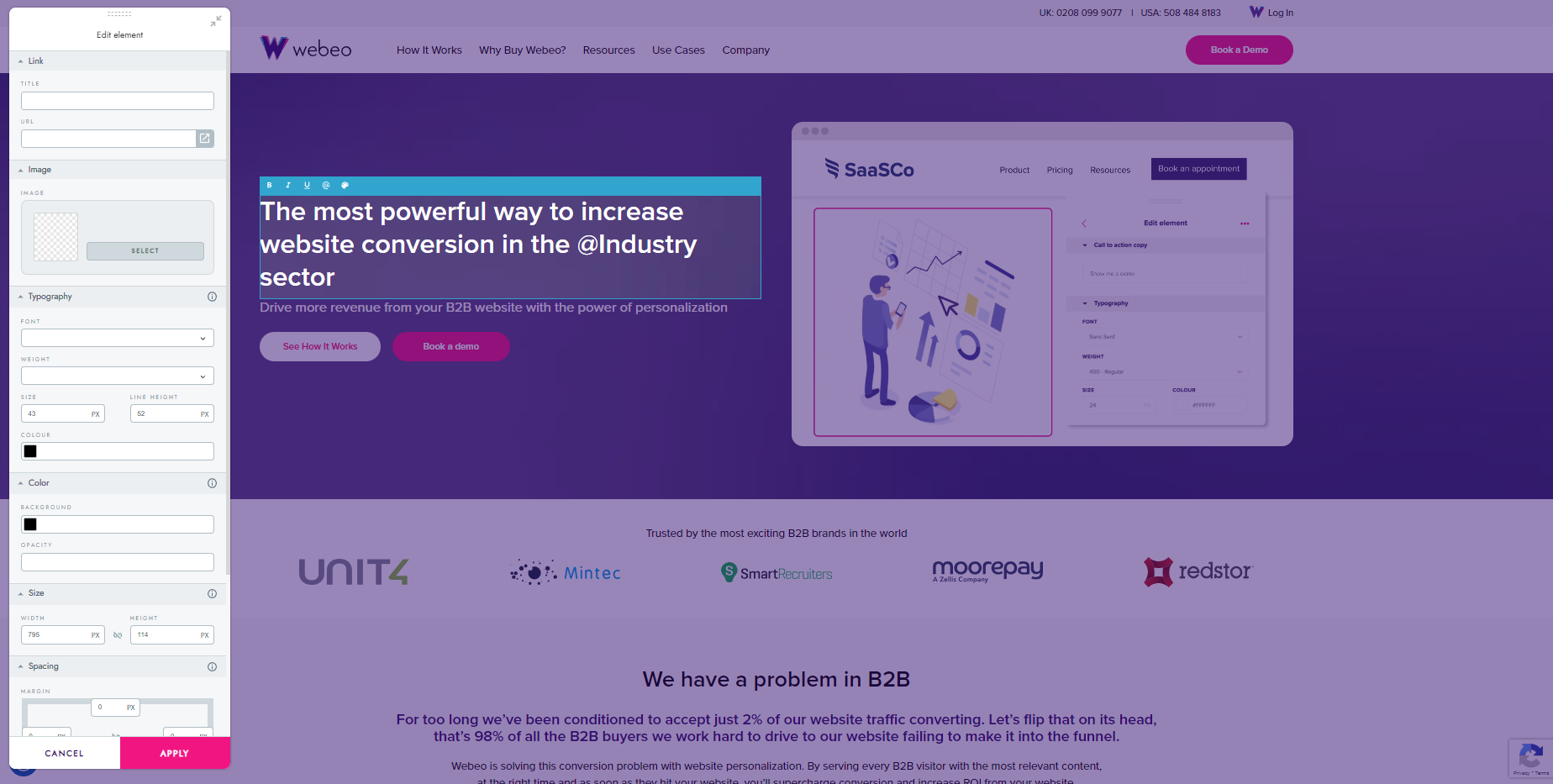

Industry based personalization
Cookies vs IP
One of the key benefits of personalization that is based on IP address, is that there is no need for cookies. Traditionally, cookies have been used to tailor online experiences. While they have their benefits, they only work if a user has already visited a site and enabled or allowed them. This can restrict marketers — although it is important to remember that data protection does not exist to limit what marketers can do, but instead to ensure safety.
Webeo has access to the largest global IP database, and can personalize experiences in real-time whether the user has visited the site before or not. Give loyal customers an experience that reminds them why they returned, and first-time visitors an experience that makes them want to come back.
If you are a B2B organization looking to take your website to the next level, it’s time to embrace the power of website personalization. Discover Webeo and see how it can transform your static website to give each visitor an experience they won’t forget. Book your free Webeo demonstration today!
FAQ’s
What specific benefits can B2B organizations expect from implementing website personalization software?
B2B website personalization tools such as Webeo, allow you to serve relevant information to each website visitor at the right time, from their very first visit. This will lead to an increase in engagement, onsite conversion, and leads from the website.
How does B2B website personalization software handle data privacy concerns, especially considering the mention of using IP addresses instead of cookies?
The IP database that Webeo uses for their B2B website personalization tool prioritizes compliance with regulations like GDPR and respecting user preference. All data included in an IP database is anonymized to ensure individual user identities are protected.
What are some practical examples illustrating successful B2B website personalization implementations?
Acumatica leverages behavioral based personalization to enhance their B2B customer experience. They started by creating an experience for first time returning visitors who had interacted across multiple pages of the site during their first visit. Knowing these visitors had an established level of interest in their product, they wanted to ensure their next visit reinforced the reasons to choose them. This resulted in a 210% conversion uplift, you can read more about their use case here.

